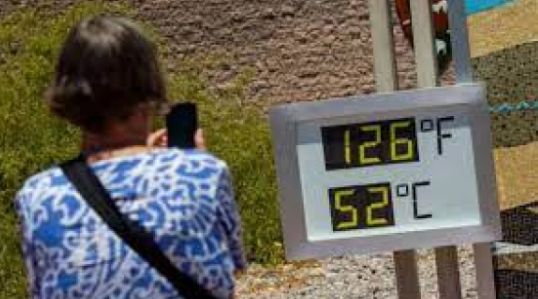A historic heat wave persisted across the western United States on Tuesday, breaking records and posing significant risks to public health with no immediate relief in sight.
Approximately 162 million people, nearly half of the US population, were residing in areas under active heat warnings, as reported by the National Weather Service. The agency warned that the “dangerous heat” would continue across the western region throughout the week before gradually moving eastward by the weekend.
It emphasized the severe threat posed by the ongoing and record-breaking heat, especially for those lacking access to cooling.
Las Vegas, Nevada, was among the locations where records were shattered, reaching its highest-ever temperature of 120 degrees Fahrenheit (48.9 degrees Celsius) on Sunday.
Meanwhile, in Texas, the White House declared a federal emergency in response to the aftermath of Storm Beryl, which had left approximately 2 million people without power as of Tuesday evening.
“The greatest concern right now is the power outages and extreme heat that is impacting Texans,” President Joe Biden said in a statement.
Meanwhile, the southeastern United States and East Coast experienced sweltering temperatures of their own, prompting heat advisories and excessive heat warnings from Florida to Massachusetts.
The heatwave has tragically led to several deaths along the US West Coast. In Death Valley, California, on Saturday, a motorcyclist died from suspected heat exposure, and another was hospitalized, according to National Park Service officials. The area, renowned as one of the hottest places on Earth, recorded a temperature of 128°F (53°C).
Further north in the Portland, Oregon area, four men have died from heat-related illnesses since Friday, as reported by local newspaper The Oregonian. Despite the Pacific Northwest generally being milder compared to the deserts of the US Southwest, temperatures remained high on Tuesday after Salem, Oregon set a daily record of 103 degrees Fahrenheit (39.3 degrees Celsius) over the weekend.
“This is a record-breaking heat wave,” Daniel Swain, a climate scientist with the University of California, Los Angeles, said during an online news conference over the weekend.
In California, some residents experienced the hottest day in living memory, surpassing even the records of their parents and grandparents. These extreme temperatures have exacerbated wildfire conditions across the state, with thousands of acres burning in active blazes.
Northwest of Santa Barbara, the Lake Fire has consumed nearly 27,000 acres (110 square kilometers), leading to evacuations and road closures as of Tuesday.
The heat wave follows what was recorded as Earth’s hottest June ever by the EU’s Copernicus Climate Change Service. Scientists attribute recurring heat waves like these to climate change, driven largely by human reliance on fossil fuels.



